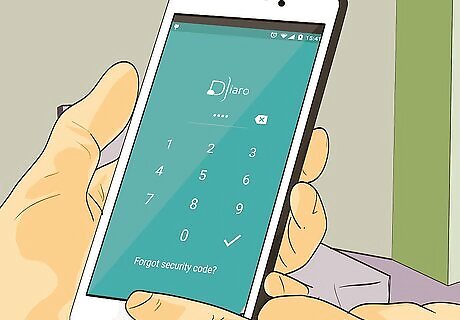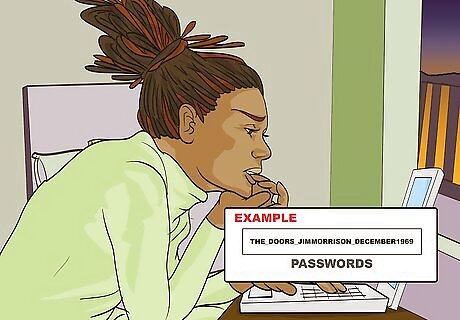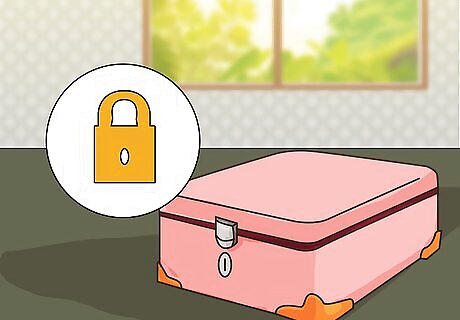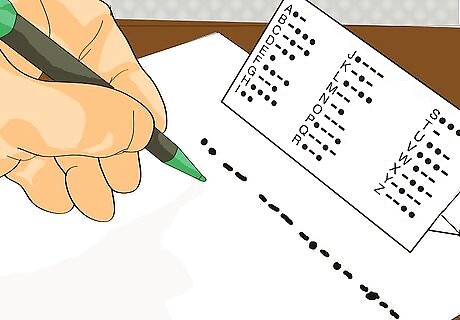
views
Hiding the Diary in Your Room

Place it under your mattress. Do not place the diary under your mattress if you think it will be turned over or replaced soon. If you don’t think it will be handled anytime soon, slide it under your mattress. To make it even more hidden, lift your mattress and place it under the center of your mattress. Make sure your bed is made when you leave the house. Your comforter should hide your mattress.

Hide it in your pillowcase. Slide the diary into your pillowcase when you are finished using it. Put it in the part of the pillowcase that touches your bed. Placing it in the front of the pillowcase will expose the shape of the diary. Make sure to remove it when it comes close to the time your pillowcases need to be washed. If you sleep with more than one pillowcase, you can put it in the pillowcase that you’re not using while you’re sleeping.
Pack it away deep in your closet. Closets are typically filled with clothes, shoes, and other miscellaneous items. This makes it a great place to hide your diary. The extra stuff in your closet can act as camouflage for it. Put it in an old bag, like a backpack, inside of a jacket you don’t usually wear, or in between some other things that aren’t used often or not used at all. Don’t put it near things you use often because your parents are more likely to go into your closet to retrieve those things for washing or other reasons.

Wedge it in between books. If you have a bookcase filled with at least one row of books, put your diary in between two books. Wedge it between two larger books. This way, you won’t see the spine of your diary. This is ideal if you have a diary that looks similar to a book. Only put your diary between books if the bookshelf is in your room. It is more likely to be discovered in a shared bookshelf.

Put it behind a picture frame. Your parents will likely look through obvious spots first, like your drawers and closet. A picture frame is a less obvious place to look. Look for a picture frame that is larger than your diary. Ideally, look for a frame that has a stand at the bottom or at the corners. Stand the diary up behind the frame. A picture frame that hangs on a wall may not work unless there is space between the back of the frame and the wall.
Keeping an Online Diary

Choose an online journaling website. The safest way to prevent your diary from being found is to not keep it in physical form. There are plenty of options for online journaling websites available on the internet. A few of those options are LiveJournal, OhLife, Penzu, and Tumblr. Look through the websites and choose one that you feel most comfortable using. If you can’t sign up for a website, consider using a Word document. You can password-protect the document, or hide it in a folder. If you have phone of your own, you can also use a journaling app. Diaro and Flavo are a couple of apps you can download on your smartphone. Some websites have a minimum age for signing up. You may have to consult with your parents if you are under thirteen years old.

Create a strong password. Don’t make up a password that can be easily figured out. For example, don’t create a password that contains your name, birthdate, favorite band, or your pet’s name. Think of a password that no one would guess. Choose a random assortment of letters and numbers to be extra cryptic. Make sure your password isn’t automatically saved on the log in page of whatever website you’ve chosen. Write down the password on a small sheet of paper if necessary. Keep it with you, or hide it in a book or drawer. Don’t write down what it is used for.

Make up an unusual username. Usernames can often be looked up on journaling websites. To prevent being found, choose a username that has nothing to do with your name, age, or favorite interests. Think of something that no one would suspect. It shouldn’t be vulgar or inappropriate, but it shouldn’t be something your parents would think to type in. Use random numbers if your username has to include numbers.

Delete your browser history. It will be easy to find your journaling website if it shows up in your browser history. If you’re using a shared computer, don’t delete the entire history. Instead, delete only the journaling website. Get rid of your browser history even if you are using your personal computer. To delete browser history, you typically go to whatever browser your using. For example, it might say Firefox, Chrome, or Safari. Then, click on it, go to history, and hit “Clear browsing data, or “Delete browsing history.” It’s also an option to use a private browsing window. A private browsing window does not save any of your history. The option for a private browsing session will usually be near your browsing on the menu where your history is located. If it’s not against your parents’ rules, set up a password to get into your computer.
Protecting Your Diary

Don’t tell anyone about your diary. It may be tempting to tell your friends, siblings, or cousins about your diary, but try not to. The way to find your journaling website is more likely to get out if people know about it. If you must tell someone, try to tell it verbally instead of sharing it through text, email, or social media.

Set out a decoy diary. Set out a “fake” diary on your dresser or in another easily accessible place. You won’t actually use this diary to write your real entries in. Instead, write some “fake” entries. You don’t have to go into elaborate detail. The entries can be simple and short. Act surprised or annoyed if you find someone reading your diary.

Put it in a locked box. Purchase a box that is big enough to put your diary into. Make sure the box has a lock that has to be opened with a key or combination. You may have to ask someone to buy it for you if you can’t go to the store without your parents. Once it is locked in the box, put it in a place that is not in plain sight, like under your bed or in a closet. You can also get a diary that comes with a lock and key. Make sure to hide the key away from the diary. If possible, keep it with you in your pocket or purse.

Start with a blank page. Don’t begin a new diary on the first page. Instead, write on the third or fourth page of the diary. It will make a person with prying eyes think the diary hasn’t been used yet, unless they flip the page a couple of times. You can also choose to write a message on the first page. It can be a warning message, or a message asking for the person to not read the diary.

Write in code. Use a code for your journal. This way, if your parents do find it, it will take effort to figure out what has been written. Some common codes to use are Morse and Pigpen cipher. Pigpen cipher exchanges letters for symbols based on a grid design. You can also make up your own code or write in another language that your parents don’t know. Don’t keep a guide to the code near your diary.

Put a thin string around your diary. Find a string that won’t be easily noticed. A thin piece of thread will do. A strand of hair will work too. Wrap it around the diary. You can also choose to just wrap it around the lock. You will know that someone has opened or attempted to open the diary if the string has moved or broken. It is also an option to put a small object, like a pebble, on top of the diary.




















Comments
0 comment